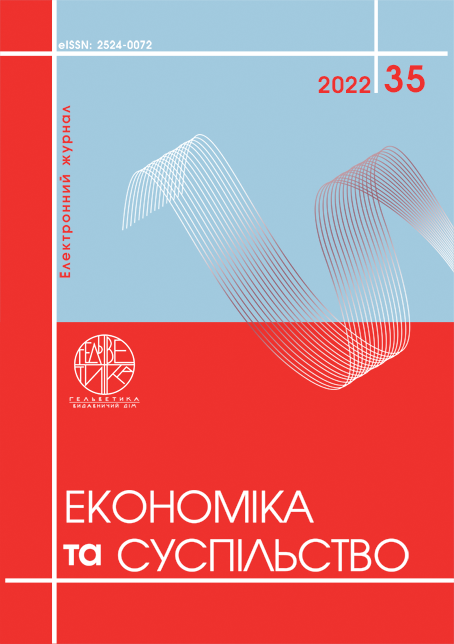THE FUTURE OF EDUCATION IN TERRITORIAL COMMUNITIES: IMPROVEMENT OF HUMAN RESOURCES AND OPTIMIZATION OF SCHOOL NETWORKS
Abstract
Reformation processes in the light more actualize the process of predicting future lighting in the territorial communities and looking for wild models of lighting management. The article is devoted to forecasting the future of education in Ukrainian communities. The average class size in the world was analyzed and it was established that due to the demographic crisis Ukraine has one of the lowest student class sizes in the world. The "understaffing" of classes is the number one problem in rural and urban communities. About 120 schools in Ukraine have an projected average occupancy rate of less than 5 students by 2024. The number of understaffed schools will increase from year to year. It is noted that along with the insufficient number of students, the most acute problem of schools in small territorial communities in Ukraine is the lack of human resources, as well as unsatisfactory school infrastructure. One understaffed primary school class costs the community about UAH 350,000 annually, and an understaffed secondary school class costs about UAH 500,000. Such spending on education hampers other areas of community life. From the economic point of view, it is more profitable to close or reduce the number of understaffed schools, but, in our opinion, such decisions should be made very carefully by local authorities, depending on the specific situation in a particular OTG and its financial capacity. Emphasis that the solution to this problem is the reorganization of school networks. The positive experience of Poland in this is studied. The model of reorganization based on the creation of support schools is outlined, which will improve the material condition of the school, improve the quality of teaching staff, increase the competitiveness of educators' salaries, professional development, and, of course, improve the quality of education in communities. Supporting educational institutions also have the opportunity to receive additional funding from the state budget - by participating in various project competitions. And in general, the more efficiently the community's finances are organized, the better the educational conditions and, consequently, the better the future of its children.
References
Актуальні питання реформування освіти в Україні : монографія / за ред. С.Л. Лондара ; ДНУ «Інститут освітньої аналітики». Київ, 2018. 246 с.
Застрожнікова І.В. Створення опорних навчальних закладів в об’єднаних територіальних громадах. Публічне адміністрування: теорія та практика. 2019. № 2(22). URL: http://www.dridu.dp.ua/zbirnik/2019-02(22)/8.pdf
Застрожнікова І.В. Трансформація національної освітньої системи в умовах децентралізації. Державне управління та місцеве самоврядування. 2019. № 4(43). С. 44–49.
Застрожнікова І.В., Ульянченко Ю.О. Сучасний стан державного регулювання освітніх новацій в Україні. Актуальні проблеми державного управління: зб. наук. пр. Харків : Вид-во ХарРІ НАДУ «Магістр», 2019. №. 2 (56). С. 192–198.
Затонацька Т. Зарубіжний досвід фінансування розвитку освіти: перспективи застосування в Україні. Вісник Київського університету ім. Тараса Шевченка. Економіка. 2012. № 139. С. 5–14.
Кремень В.Г. Проблеми якості української освіти в контексті сучасних цивілізаційних змін. Український педагогічний журнал. 2015. № 1. С. 8–15.
Малишко В.В., Макарчук І.М., Гордієнко Ю.В. Фінансування освіти в Україні. Економічний вісник університету. 2018. Вип. 38. С. 132–139.
Оршанський Р. Про потребу кардинальних змін у галузі вітчизняної освіти. Актуальні питання гуманізації. 2016. № 5. С. 371–378.
Londar, L. (Ed.) (2018) Aktualni pytannia reformuvannia osvity v Ukraini [Topical issues of education reform in Ukraine]. Kyiv. (in Ukrainian)
Zastrozhnіkova І.V. (2019) Stvorennya opornih navchal'nih zakladіv v ob’єdnanih teritorіal'nih gromadah. [Establishment of support educational institutions in the united territorial communities]. Public administration: theory and practice. (electronic journal), vol. 2(22). Available at: http://www.dridu.dp.ua/zbirnik/2019-02(22)/8.pdf (accessed 10 January 2022).
Zastrozhnіkova І.V. (2019) Transformacіya nacіonal'noї osvіtn'oї sistemi v umovah decentralіzacії. [Transformation of the national educational system in the conditions of decentralization]. Public administration and local self-government, vol. 4 (43), рр. 44–49. (in Ukrainian)
Zastrozhnikova I.V., Ulianchenko Yu.O. (2019) Suchasnyi stan derzhavnoho rehuliuvannia osvitnikh novatsii v Ukraini [The current state of state regulation of educational innovations in Ukraine]. Aktualni problemy derzhavnoho upravlinnia: zb. nauk. pr. Kharkiv: Vyd-vo KharRI NADU «Mahistr», vol. 2 (56), pp. 192–198.
Zatonatska, T. (2012) Zarubizhnyi dosvid finansuvannia rozvytku osvity: perspektyvy zastosuvannia v Ukraini [Foreign experience in financing educational development: prospects for application in Ukraine]. Bulletin of Taras Shevchenko Kyiv National University, no. 139, рр. 5–14. (in Ukrainian)
Kremen V.G. (2015) Problemi yakosti ukrainskoji osviti v konteksti suchasnih tsivilizatsiynih zmin [Problems of the quality of Ukrainian education in the context of modern civilizational changes]. Ukrainian Pedagogical Journal, vol. 1, рр. 8–15. (in Ukrainian)
Malyshko V.V., Makarchuk I.M., Gordienko Y.V. (2018) Finansuvannya osvity v Ukrayini [Financing of education in Ukraine]. Ekonomichnyy visnyk universytetu. Economic Bulletin of the University. Economy, vol. 38, рр. 132–139. (in Ukrainian)
Orshansky R. (2016) Pro potrebu kardinalnih zmin u galuzi vitchiznyanoji osviti [On the need for radical changes in the field оf domestic education]. Actual questions of the humanities, vol. 16, рр. 371–378. (in Ukrainian)


